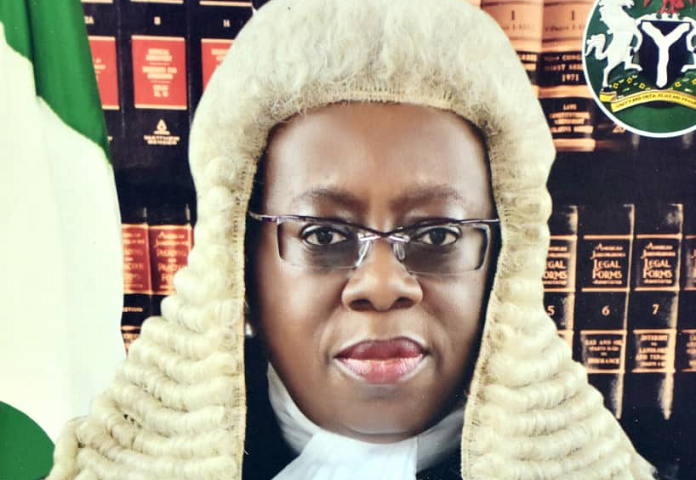Justice Kudirat Kekere-Ekun of the Supreme Court of Nigeria (SCN) is set to emerge as the next Chief Justice of Nigeria (CJN).

Justice Kekere-Ekun is the most senior Justice of the Supreme Court after the outgoing Chief Justice of Nigeria, Justice Olukayode Ariwoola.
By the age-long tradition of the bench, Justice Kekere-Ekun takes over the judiciary leadership on the day the head of the Supreme Court bows out, at least, in acting capacity pending when her appointment would undergo compulsory constitutional process.
If she eventually assumes the office, Kekere-Ekun would become the second female justice in Nigeria to hold the exalted position after Mariam Aloma Mukhtar, who was CJN between July 2012 and November 2014, spending 28 months in office.
The current occupant of the office, Justice Olukayode Ariwoola, who assumed office on June 27, 2022, will formally bow out on Thursday, August 22, 2024, after attaining the mandatory retirement age of 70 years.
The incoming CJN, who is 66 years old, may stay up to four years compared to the average of two years most of her predecessors held the position.
After 11 years at the Supreme Court, Justice Kekere-Ekun will not only become the next CJN but also head the National Judicial Council (NJC), which oversees the appointment, promotion, and discipline of judges across the country.
Justice Kekere-Ekun was born on May 7, 1958 and obtained her LL. B in 1980 from the University of Lagos and LL.M from the London School of Economics and Political Science in November 1983.
She was called to the Nigerian Bar on 10th July, 1981.
From 1985 to 1989, she was in private practice and was later appointed a Senior Magistrate Grade II, Lagos State Judiciary in December 1989. She was appointed a judge of the High Court of Lagos State on July 19, 1996. She served as the chairman of the Robbery and Firearms Tribunal, Zone II, Ikeja, Lagos, from November 1996 to May 1999.
Kekere-Ekun was elevated to the Court of Appeal on 22nd September, 2004, where she served in various Divisions and as the presiding justice of two Divisions of the appellate court (Makurdi and Aku) in 2011 and 2012, respectively.
She was elevated to the Supreme Court of Nigeria as the fifth female justice of the apex court and sworn in on Monday, July 8, 2013.
She has attended numerous courses and seminars within and outside Nigeria and received several merit awards.
Justice Kekere-Ekun is also a life Bencher, a member of the International Association of Women Judges and its president.
The judiciary has been in the eye of the storm, notably since the country returned to democratic rule in 1999.
With Justice Kekere-Ekun assuming office in the next few weeks, the succession battle in the Supreme Court may be rancour-free for the first time in five years.
Justice Walter Onnoghen, who served as CJN between 7th March, 2017 and 25th January 2019, left controversially after he was accused of failing to declare his assets.
His successor, Justice Tanko Muhammad, who assumed office on 25th January, 2019, followed almost the same pattern after his fellow justices accused him of unfair treatment, particularly in the area of their welfare.
He voluntarily resigned on the grounds of ill-health on 27th June, 2022.
The CJN is the head of the government’s judicial arm.
He presides over the country’s Supreme Court and the National Judicial Council.
The outgoing CJN (Ariwoola) was appointed acting CJN on 27th June, 2022 upon Justice Tanko Muhammad’s resignation and was confirmed by the Nigerian Senate on 21st September, 2022.
The Supreme Court of Nigeria is the highest, and its decisions are final.
The president nominates the CJN upon the recommendation by the NJC, and is subject to confirmation by the Senate.
The CJN holds office at the pleasure of the Nigerian constitution and can only be removed from office due to death or on attainment of age 70, whichever comes first, or by impeachment by the Senate of the Federal Republic of Nigeria, which requires a super majority of the Senate members.
Short Stay In Office Based On Rules – Senior lawyers
In the last 15 years, seven CJNs have presided over the affairs of the nation’s judiciary, which is about an average of two years each for the occupants of that office.
Lawyers have, however, lamented the short stay in office of the CJNs.
According to them, an average of two years in office is not enough to bring about the needed reforms in the country’s judiciary.
However, some senior lawyers were quick to assert that the CJN’s office was not a political appointment.
According to them, it is regulated by law.
A former attorney-general and commissioner for justice in Imo state, Chief Chukwuma-Machukwu Ume (SAN), said the apex court was not a political party whose programmes and policies are personal.
According to him, the CJN was an administrator and is not expected to bring his agenda to run the court.
“The court is regulated by law, and the law is the law; there is nothing you can do about it. The Supreme Court is not a political party where one man is expected to bring his agenda to the table after winning election,” he said.
Another lawyer, Barrister Abdul Balogun, said rules for succession to the CJN’s office have already been laid down.
“Laws and rules guide the judiciary, and any attempt to deviate from them is a call to lawlessness, which will negatively impact the country’s judiciary.
“In the judiciary as a whole, it is a laid down rule that the most senior assumes office upon a vacancy in the leadership of any court from the customary court to the Supreme Court. So, any attempt to deviate from that is a call for chaos in the system,” he said
In the last 15 years, the country has produced seven CJNs.
While some of them left an indelible mark in office and in the minds of Nigerians with their policies and reforms to the country’s judiciary, others had their tenures characterised by controversies.
Aloysius Iyorgyer Katsina-Alu (2009- 2011)
From his very first day in office, there was controversy after he was sworn in by his predecessor. He was the first CJN to be sworn in by his predecessor, Justice Idris Legbo Kutigi (rtd), due to the unavailability of the then ailing President Umaru Yar’Adua, who did not hand over powers to then Vice President Goodluck Jonathan.
Yar’Adua never returned to the country until his death.
Justice Katsina-Alu’s tenure as the CJN was also marked by his controversial battle with the then President of the Court of Appeal, Justice Isa Ayo Salami (rtd), who the NJC later suspended.
Dahiru Musdapher (2011-2012)
His tenure as CJN was crisis-free; rather, he brought some reforms that impacted positively on the judiciary.
Some of his reforms are still being implemented today.
The Jigawa State-born Musdapher was appointed Chief Justice of Nigeria on August 27, 2011, and sworn in by former President Goodluck Jonathan on August 29, 2011.
He served as Chief Judge of Kano State between 1979 and 1985.
Musdapher, a native of Babura town, served as a member of the Court of Appeal between 1985 and 2003 and later joined the Supreme Court.
During his tenure, he admitted that the judiciary needed radical surgical reforms and called on all Nigerian judges to rise above the daunting challenges by restoring hope and confidence in the judicial system.
MARIAM ALOMA MUKHTAR (2012 – 2014)
Justice Mukhtar could be described as a judge who came, who saw and, to an extent, reinvigorated the fervor to stamp out the burden of corruption that has, in no small measure, weighed down the scale of justice in Nigeria.
She spent barely 28 months in office. She took over from Justice Dahiru Musdapher on July 15, 2012.
Undisputedly, no administration in the judiciary ever attempted to fight corruption like Mukhtar, during whose short regime about seven judges were sacked.
Remarkably, no woman had attained that position since 1963, when the Federal Republic of Nigeria was proclaimed, and Dr Nnamdi Azikiwe became its first President.
The situation deteriorated to the extent that an ex-CJN and a sitting president of the Court of Appeal publicly poked themselves over an alleged plan to subvert justice in a gubernatorial dispute involving Sokoto State.
Consequently, on July 11, 2012, while answering questions from the Nigerian Senate, Justice Mukhtar admitted the presence of bad eggs at the top echelon of the judicial arm of government, even as she vowed to fight and expose such persons before her exit from office.
A few days after she assumed duties, Justice Mukhtar reviewed 337 petitions filed against judicial officers before the NJC.
Hence, it was not surprising that seven justices were sacked within two years of her tenure.
MAHMUD MOHAMMED (2014 – 2016)
Justice Mohammed was also less controversial in his about two years in office as CJN.
He was born on November 10, 1946, in Jalingo, Taraba State.
He studied for his Bachelor’s degree in Law (LL.B) at Ahmadu Bello University, Zaria, graduating in 1970. After that, he attended the Nigerian Law School in Lagos and was subsequently called to the Bar in 1971.
He began his career in the public service with the Ministry of Justice of the defunct North-eastern and Gongola States and served on the Gongola Bench.
WALTER ONNOGHEN (2017 – 2019)
Justice Onnoghen began his tenure as CJN on a controversial note and ended it on the same note.
When he was appointed in acting capacity, it appeared that former President Muhammadu Buhari never wanted him to become the substantive CJN as it took him several months to confirm his appointment.
In fact, it was Professor Yemi Osinbajo (SAN), the former vice president who acted as president when Buhari was away on a medical trip, that confirmed Onnoghen’s appointment.
Midway into his tenure as CJN, he was accused of corruption and removed from office after he was asked to resign.
His resignation from office followed the recommendation of the NJC for his early retirement.
The recommendation was sent to Buhari, who readily accepted it.
Justice Onnoghen faced trial at the Code of Conduct Tribunal over allegations of false declaration of assets.
The Economic and Financial Crimes Commission (EFCC) also accused the former CJN of receiving illicit payments and bribes from lawyers. He denied all the allegations.
Not a few Nigerians read political undertone in his tribulation, especially as the 2019 general elections were fast approaching.
IBRAHIM TANKO MUHAMMAD (2019 – 2022)
Like his predecessor, Justice Tanko Muhammad assumed office on a controversial note and also exited under questionable circumstances.
After Justice Onnoghen was eased out, many believed it was to prepare Justice Muhammad to become the CJN.
Some believed the former president tainted Onnoghen with a corruption tag to make way for Muhammad, also a northerner.
Like Onnoghen, he could not finish his tenure, but due to ill health.
There was confusion in the media over his resignation.
However, after many weeks of denial and confusion, it was later confirmed that he resigned as CJN on health grounds.
Shortly before his resignation, he officially reacted to the allegations of uncaring attitude levelled against him by his fellow justices in the apex court.
In his first official reaction, he admitted that the Supreme Court, like any other establishment in the country, had been hit by a devastating economic crunch and the court’s leadership under him could no longer meet some of its obligations to the justices, especially in welfare.
OLUKAYODE ARIWOOLA (2022 -2024)
Justice Ariwoola took the oath of office as the acting CJN at the Presidential Villa in Abuja on June 27, 2022.
He is, arguably, one of the finest CJNs the country has produced with his policies and programmes for the judiciary.
However, like some of his predecessors, his tenure is fraught with controversies, especially as the judiciary under him came to be seen as being in the pockets of the political class.
In fact, retiring Supreme Court justices in his tenure used their valedictory speeches to lampoon the judiciary under his watch and so many Nigerians have lamented that the present judiciary dispenses judgment rather than justice.
Whoever takes the mantle after Ariwoola will have a herculean task repairing the battered image of the judiciary in order to restore the confidence of the people in that arm of government.
With additional report from Leadership










